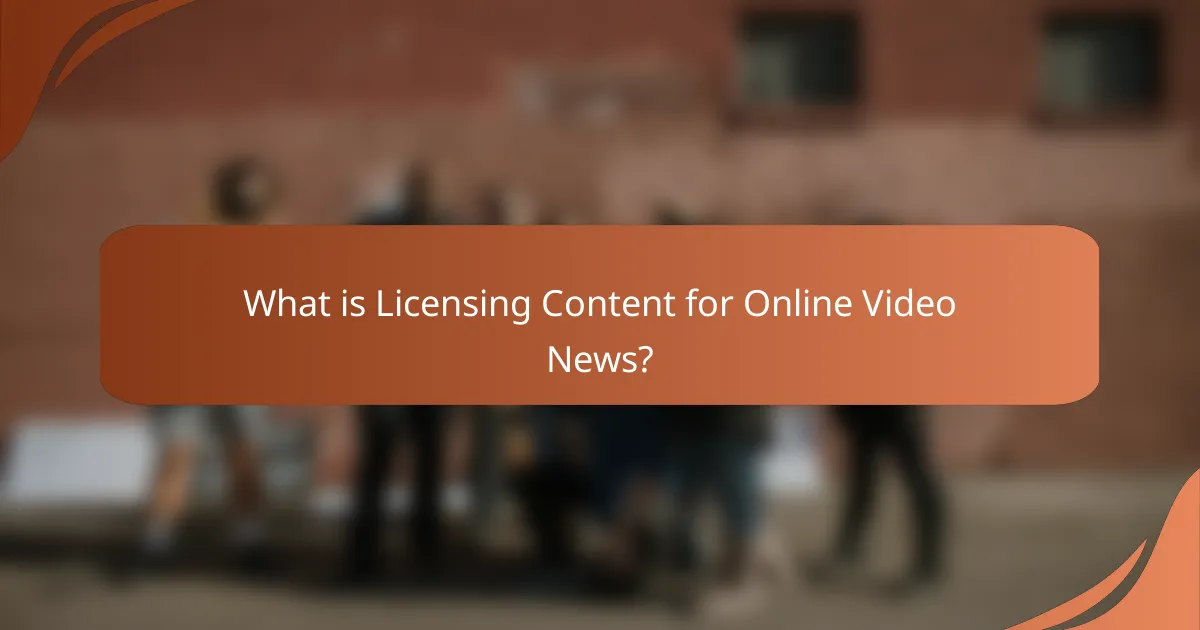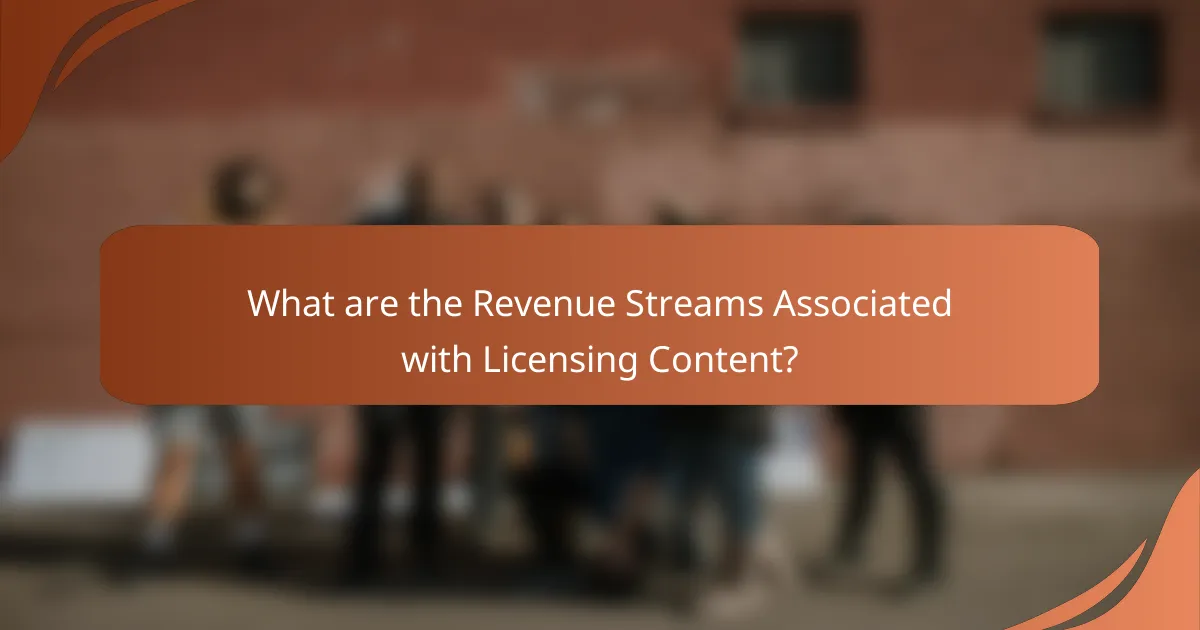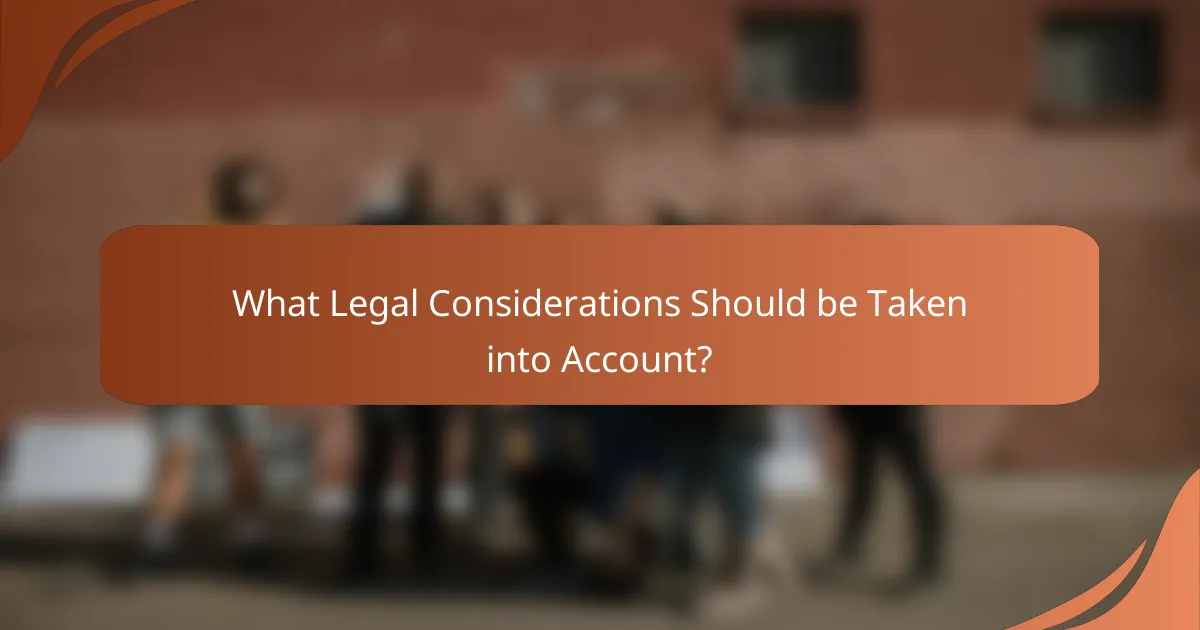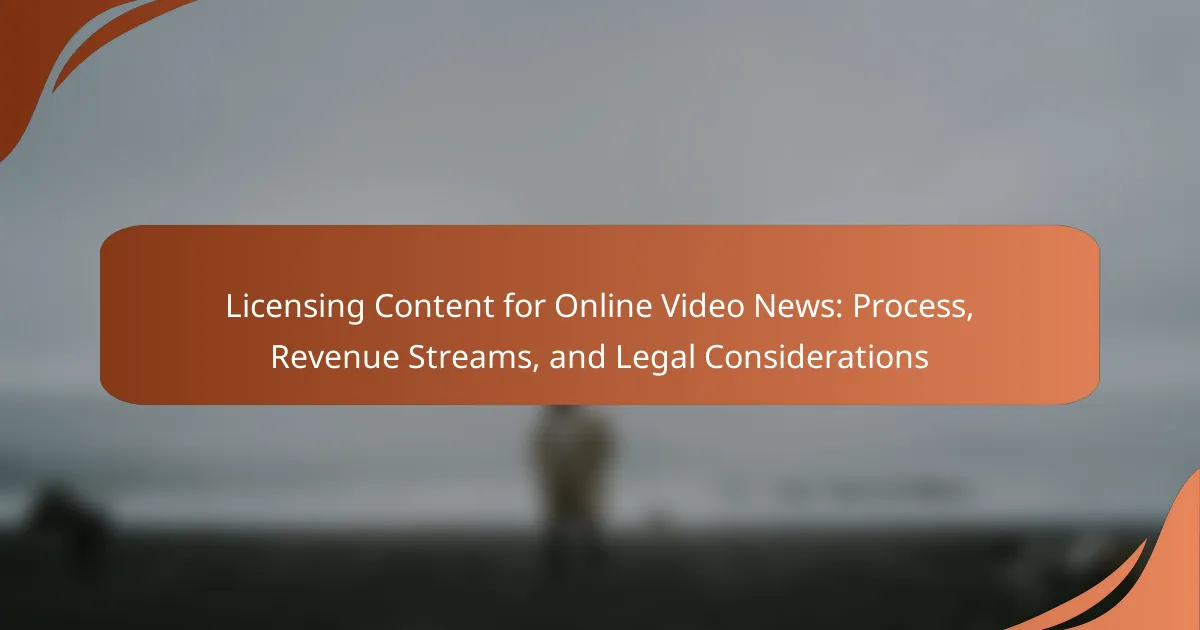Licensing content for online video news is the process of obtaining legal permission to use video materials created by others, which is crucial for news organizations to distribute and monetize their broadcasts. This article outlines the essential elements of licensing agreements, including terms of use, payment structures, and geographical restrictions, while emphasizing the protection of content creators’ rights. It further discusses various revenue streams associated with licensing, such as royalties, licensing fees, and syndication revenues, highlighting the financial potential of these practices. Additionally, the article addresses legal considerations, including copyright compliance, fair use, and platform-specific regulations, which are vital for ensuring adherence to legal standards in content distribution.

What is Licensing Content for Online Video News?
Licensing content for online video news involves obtaining legal permission to use video materials created by others. This process is essential for news organizations to ensure they can legally distribute and monetize video content. Licensing agreements typically outline the terms of use, including duration, geographical restrictions, and payment terms. These agreements protect the rights of content creators while allowing news outlets to enhance their broadcasts with diverse video sources. According to a report by the International News Media Association, proper licensing can significantly increase revenue opportunities for news organizations. This highlights the importance of understanding licensing in the digital news landscape.
How does the licensing process work for online video news?
The licensing process for online video news involves obtaining rights to use video content legally. Content creators or distributors must negotiate terms with rights holders. This often includes fees, duration of use, and geographic restrictions. A licensing agreement should clearly define these terms to avoid legal issues.
Online platforms typically require licenses to ensure compliance with copyright laws. Failure to secure proper licensing can lead to legal consequences, including fines or content removal. Many news organizations also rely on established licensing agencies for streamlined access to video content.
According to the U.S. Copyright Office, unauthorized use of copyrighted material is prohibited, reinforcing the need for proper licensing.
What are the key steps involved in obtaining licenses?
The key steps involved in obtaining licenses include researching licensing requirements, preparing necessary documentation, and submitting an application. First, individuals or organizations must identify the specific licenses needed for their activities. This often involves understanding local, state, and federal regulations. Next, applicants must gather required documents, which may include identification, business permits, and financial statements. After preparing the documentation, the application is submitted to the relevant authority. This submission may involve paying a fee. Following submission, applicants should monitor the status of their application. Finally, once approved, it is crucial to comply with all terms and conditions of the license.
How do licensing agreements differ among content types?
Licensing agreements differ among content types based on the nature and usage of the content. For example, music licensing often requires specific permissions for public performance, while film licensing may involve rights for distribution and exhibition. Textual content licensing typically allows for reproduction and adaptation, but may not cover public display without additional agreements. Each content type has unique legal requirements and considerations that dictate how licensing agreements are structured. Furthermore, the duration and territory of the license can vary significantly across content types, impacting how the content can be used commercially. Understanding these differences is crucial for compliance and maximizing revenue potential in online video news.
Why is licensing important for online video news platforms?
Licensing is crucial for online video news platforms to ensure legal compliance and protect intellectual property. It allows platforms to use copyrighted content without infringing on rights. Licensing agreements define the terms of use, including duration and distribution rights. This legal framework helps avoid costly lawsuits. Additionally, licensing can enhance credibility by ensuring content quality and authenticity. According to a study by the International News Media Association, licensed content can increase audience trust. Therefore, proper licensing is essential for operational sustainability and reputation management in the competitive news landscape.
What legal protections does licensing provide to content creators?
Licensing provides legal protections to content creators by granting them exclusive rights to their work. This exclusivity prevents unauthorized use or reproduction of their content. Licensing agreements can specify terms of use, duration, and compensation. They also establish legal recourse for infringement. Content creators can seek damages if their work is used without permission. Licensing can enhance the creator’s control over how their content is distributed. It also helps in building a brand identity and reputation. This protection is essential in the digital landscape, where content is easily shared and copied.
How does licensing impact the credibility of news sources?
Licensing enhances the credibility of news sources by ensuring compliance with legal and ethical standards. Licensed news organizations are subject to regulatory oversight. This oversight promotes accountability and reliability in reporting. Furthermore, licensing often requires adherence to journalistic practices. These practices include fact-checking and transparency. Research indicates that audiences perceive licensed sources as more trustworthy. A study by the Pew Research Center found that 66% of Americans believe licensed news organizations are more credible. Thus, licensing serves as a mechanism for establishing trust in news media.

What are the Revenue Streams Associated with Licensing Content?
Revenue streams associated with licensing content include royalties, licensing fees, and syndication revenues. Royalties are payments made to content creators based on usage or distribution. Licensing fees are upfront payments for the rights to use the content. Syndication revenues arise from distributing content across multiple platforms or networks. These streams can provide significant income for content owners. According to a report by the International Federation of the Phonographic Industry, licensing revenues in the music industry alone reached $1.4 billion in 2020, highlighting the financial potential of licensing.
How do online video news platforms monetize licensed content?
Online video news platforms monetize licensed content primarily through advertising revenue. They integrate ads into their video streams, which generates income based on viewer engagement. Additionally, platforms may charge subscription fees for premium content access. Licensing agreements can also include revenue-sharing models with content creators. Sponsored content is another avenue, where brands pay for product placements within news segments. Some platforms utilize pay-per-view models for exclusive licensed content. The effectiveness of these monetization strategies often relies on audience size and engagement metrics. According to a report by eMarketer, digital video ad spending in the U.S. is expected to exceed $50 billion by 2024, highlighting the lucrative potential of this revenue stream.
What types of revenue models are commonly used?
Commonly used revenue models include subscription, advertising, pay-per-view, and licensing. Subscription models charge users a recurring fee for access to content. Advertising models generate revenue through ads displayed alongside content. Pay-per-view models charge users for individual content access. Licensing allows content creators to sell rights to use their material. These models are prevalent in the online video news industry, facilitating diverse revenue streams.
How does advertising revenue relate to licensed content?
Advertising revenue is significantly influenced by licensed content. Licensed content attracts audiences, which in turn enhances advertising opportunities. Advertisers often seek platforms with high-quality, engaging content. Licensed content can provide that quality, making platforms more appealing to advertisers. For instance, news outlets that use licensed footage may draw larger viewership. This larger audience can lead to increased ad sales and higher revenue. Additionally, licensed content can differentiate a brand, allowing for premium ad placements. Thus, the relationship between advertising revenue and licensed content is symbiotic, where quality content drives revenue growth.
What are potential challenges in generating revenue from licensed content?
Generating revenue from licensed content presents several challenges. One major challenge is negotiating fair licensing fees that reflect the value of the content. Content creators may demand high fees, impacting profitability. Additionally, there can be competition for popular licensed content, driving prices up. Another challenge is ensuring compliance with licensing agreements. Failure to comply can lead to legal disputes and financial penalties. Market saturation can also hinder revenue growth, as many outlets may use the same licensed content. Lastly, audience engagement can fluctuate, affecting revenue consistency. These factors collectively complicate revenue generation from licensed content.
How can content licensing costs affect profitability?
Content licensing costs directly impact profitability by reducing the overall revenue available to a business. High licensing fees can consume a significant portion of a company’s budget. This leaves less capital for other operational expenses or investments. Consequently, lower profit margins may result. For example, if licensing fees account for 30% of revenue, only 70% remains for profit. Additionally, if a company cannot manage these costs effectively, it may face financial strain. This can lead to price increases for consumers, potentially reducing demand. Ultimately, managing content licensing costs is crucial for maintaining profitability in the competitive online video news market.
What are the risks of copyright infringement in licensing?
Copyright infringement in licensing can lead to significant legal and financial risks. Unauthorized use of copyrighted material may result in lawsuits. These lawsuits can incur substantial legal fees and damages. Additionally, copyright holders may seek injunctions to stop the infringing activity. This can disrupt business operations and lead to loss of revenue. Companies may also face reputational damage from infringement claims. According to a study by the Copyright Alliance, copyright infringement costs the U.S. economy billions annually. Compliance with licensing agreements is essential to mitigate these risks.

What Legal Considerations Should be Taken into Account?
Legal considerations for licensing content in online video news include copyright compliance, licensing agreements, and fair use. Copyright compliance ensures that all content used is either owned, licensed, or falls under fair use. Licensing agreements outline the terms of use, including duration, territory, and payment. Fair use allows limited use of copyrighted material without permission under specific conditions, such as commentary or criticism. Additionally, understanding platform-specific regulations is crucial, as each platform may have its own content guidelines. Legal liability must also be assessed to avoid potential lawsuits or penalties. These considerations protect creators and ensure adherence to legal standards in content distribution.
What are the key legal frameworks governing content licensing?
The key legal frameworks governing content licensing include copyright law, contract law, and international treaties. Copyright law protects original works, giving creators exclusive rights. Contract law governs agreements between parties regarding the use of content. International treaties, such as the Berne Convention, establish standards for copyright protection across countries. These frameworks ensure creators can monetize their work while protecting their rights. They also provide a legal basis for resolving disputes related to content use. Understanding these laws is essential for content creators and distributors in the online video news industry.
How do copyright laws affect licensing agreements?
Copyright laws govern the usage and distribution of creative works. These laws directly impact licensing agreements by establishing the rights of creators and users. Licensing agreements must comply with copyright regulations to be enforceable. They define how copyrighted material can be used, shared, or modified. Failure to adhere to copyright laws can lead to legal disputes. For example, unauthorized use of copyrighted content can result in penalties. Copyright laws also determine the duration and scope of licensing agreements. This ensures that creators are compensated for their work. Therefore, understanding copyright laws is essential for drafting effective licensing agreements.
What role do international laws play in licensing content?
International laws establish the framework for licensing content across borders. They ensure that content creators and distributors adhere to copyright, intellectual property, and trade agreements. These laws protect the rights of content owners while facilitating international distribution. For instance, the Berne Convention mandates that member countries recognize copyright without the need for formal registration. This encourages creators to license their work internationally, knowing their rights are protected. Additionally, international treaties help resolve disputes related to content licensing, providing a legal basis for enforcement. Thus, international laws play a crucial role in shaping the landscape of content licensing globally.
What are best practices for navigating legal issues in content licensing?
Best practices for navigating legal issues in content licensing include understanding copyright laws and licensing agreements. Content creators should conduct thorough research on the ownership of materials before use. Clear documentation of agreements is essential to avoid disputes. It’s important to negotiate terms that protect both parties’ rights. Regularly reviewing licensing agreements helps ensure compliance with legal standards. Engaging legal counsel can provide expert guidance on complex issues. Staying updated on changes in copyright law is crucial for ongoing compliance. Finally, establishing a clear communication channel with licensors can prevent misunderstandings.
How can online video news platforms ensure compliance with licensing laws?
Online video news platforms can ensure compliance with licensing laws by obtaining proper licenses for all content. This includes securing rights for video, audio, and images used in their productions. Platforms should maintain clear records of all licensing agreements. Regular audits can help verify compliance with these agreements. Additionally, platforms must stay updated on copyright laws and changes in licensing regulations. Consulting with legal experts in media law is also advisable. Implementing a robust content management system can facilitate tracking licensing information. These measures help mitigate the risk of legal disputes and financial penalties.
What resources are available for understanding licensing legalities?
Legal textbooks provide foundational knowledge on licensing law. Websites like Nolo and LegalZoom offer accessible legal guidance. Professional organizations, such as the American Bar Association, provide resources and networking opportunities. Online courses on platforms like Coursera cover licensing legalities in detail. Government websites often have information on specific licensing regulations. Legal blogs and forums can offer insights from industry professionals. Consulting with a licensed attorney can provide tailored advice on specific situations. These resources collectively enhance understanding of licensing legalities.
What tips can help streamline the licensing process for online video news?
Establish clear communication with licensing authorities to expedite approvals. Provide all necessary documentation upfront to avoid delays. Utilize standardized licensing agreements to simplify negotiations. Leverage technology for efficient tracking and management of licenses. Build relationships with content providers to facilitate smoother transactions. Stay updated on legal requirements to prevent compliance issues. Regularly review and optimize licensing workflows to enhance efficiency.
Licensing content for online video news is the process of obtaining legal permission to use video materials created by others, which is essential for news organizations to distribute and monetize content legally. This article outlines the licensing process, key steps involved, and the importance of compliance with copyright laws. It also discusses the various revenue streams associated with licensed content, including royalties and advertising revenue, while highlighting the legal considerations and best practices for navigating licensing agreements. Understanding these elements is crucial for news platforms to enhance credibility, avoid legal risks, and maximize profitability in the competitive digital landscape.
